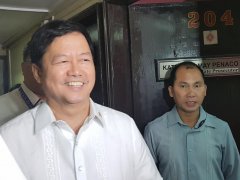News
DOJ to comply with SC decision voiding travel ban circular

“We respect the decision of the Supreme Court on this sensitive issue. There are law enforcement issues that we need to address,” Justice Secretary Menardo Guevarra said in a text message when sought for a comment. (PNA photo)
MANILA — The Department of Justice (DOJ) said Wednesday it would abide by the Supreme Court (SC) decision declaring as unconstitutional the circular it has earlier issued for being violative of the right to travel under Article III, Section 6 of the 1987 Constitution.
“We respect the decision of the Supreme Court on this sensitive issue. There are law enforcement issues that we need to address,” Justice Secretary Menardo Guevarra said in a text message when sought for a comment.
The justice chief said he would also meet with officials of the Bureau of Immigration to discuss the effect of the high court’s decision.
Asked if the DOJ would appeal the SC ruling, Guevarra said he would have to consult Solicitor General Jose Calida regarding “our way forward.”
On Tuesday, the SC, in a unanimous vote, declared unconstitutional the DOJ circular issued by then justice secretary and now detained Senator Leila de Lima to prevent former president and now Pampanga Rep. Gloria Macapagal-Arroyo from leaving the country to seek medical treatment in 2011.
This means that all issuances released pursuant to the DOJ circular are null and void.
It was on the basis of DOJ Circular No. 41 that de Lima issued three watch list orders (WLOs) against the petitioners, including Macapagal-Arroyo and former first gentleman Jose Miguel Arroyo, and the hold departure orders (HDO) against former Philippine Amusement and Gaming Corp. chairman Efraim Genuino and his two children, Erwin and Sheryl.
The petitioners pointed out that Section 6, Article III of the Constitution, explicitly states that the right to travel shall not be impaired except “in the interest of national security, public safety, or public health, as may be provided by law.”
However, the petitioners noted that none of the limitations was cited by de Lima in turning down Macapagal- Arroyo’s plea to be allowed to travel and seek medical treatment for her rare bone disease.
The petitioners added that de Lima violated the constitutional provision on the separation of powers among the co-equal branches of the government and the principle of checks and balances when she refused to implement the SC’s temporary restraining order (TRO), which was supposed to be immediately executory.
The TRO ordered the DOJ to halt the implementation of its orders placing the Arroyo couple on the Bureau of Immigration’s watch list and denying their request for the issuance of an allow departure order (ADO) on the basis of DOJ Circular No. 41.
It can be recalled that in November 2011, airport immigration officials prevented the Arroyo couple and several aides from leaving the country upon the directive of de Lima, even though they were armed with a copy of the SC TRO.
Macapagal-Arroyo was supposed to seek medical treatment in Singapore, Spain and possibly in Germany for her hypoparathyroidism and metabolic bone disorder.
The travel ban imposed by de Lima also covers the former first gentleman’s co-respondents in the electoral sabotage case, namely former Commission on Elections chairman Benjamin Abalos, former Comelec commissioner Nicodemo Ferrer, former justice secretary Alberto Agra, former Presidential Adviser on Political Affairs Gabriel Claudio, Maguindanao official Norie Unas, Datu Andal Ampatuan Sr., and Lintang Bedol.
Aside from violating Article III, Section 6, the petitioners argued that the circular gives the justice secretary an “unbridled discretion” in issuing WLOs and HDOs.
The circular noted that the Supreme Court circular allowing the Regional Trial Courts (RTC) to issue an HDO is silent on cases falling below the jurisdiction of the RTC or those subject to investigation by the government prosecution offices.
“Apart from the courts, the Secretary of Justice as head of the principal law agency of the government mandated to, inter alia, investigate the commission of crimes, prosecute offenders, and provide immigration regulatory services, is in the best position to institute measures to prevent any miscarriage of justice, without, however, sacrificing the individual’s right to travel,” read the circular issued in 2010.
The high court conducted an oral argument on the case where de Lima insisted that the authority to issue HDOs against individuals facing criminal investigation was an “inherent power” of the government as embodied in Executive Order No. 292, or the Administrative Code of 1987.





















